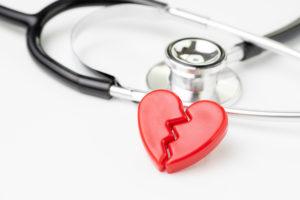
Now, a new study is showing it could be leading to increases in “broken heart syndrome.”
It feels like a heart attack, but it isn’t.
Broken heart syndrome, officially called stress cardiomyopathy, is marked by a temporary weakness in the heart resulting from a surge in stress hormones. It causes chest pain and breathlessness, but there is no evidence of damage.
According to new work in JAMA Network Open, COVID-19 has resulted in a four-to five-fold uptick in cases. The increase was noticed in two Cleveland Clinic hospitals.
Roughly 8% of patients who arrived in the emergency room of the hospitals reporting chest pain, shortness of breath, and other heart symptoms were found to be suffering from cardiomyopathy. This is up from a range of 1.5%–1.8%.
Studies have suggested that COVID-19 can lead to heart complications. But none of the patients with stress cardiomyopathy tested positive for the virus.
One cardiologist who worked on the study said the result “suggests this is not a reflection of the virus, but the stress of the pandemic.”
Stress cardiomyopathy typically occurs after going through a traumatic experience like a divorce, death of a loved one, or another major life event. It may not always happen immediately following a traumatic experience, either. Fear can also play a role.
Unlike a heart attack, there is no long-term or structural damage associated with broken heart syndrome. No blocked arteries or muscle cell damage. It causes brief pain and concern, then it’s gone, and you’re back to normal.
Unfortunately, there is no way for you to tell what’s happening when the symptoms hit. Therefore, it’s essential to seek medical attention whenever a heart issue is suspected.
Finding ways to ease stress is the best way of preventing cardiomyopathy. Exercise, mindfulness, Tai Chi, or a break from the news are all ways to help you cope with the pressures of the pandemic.